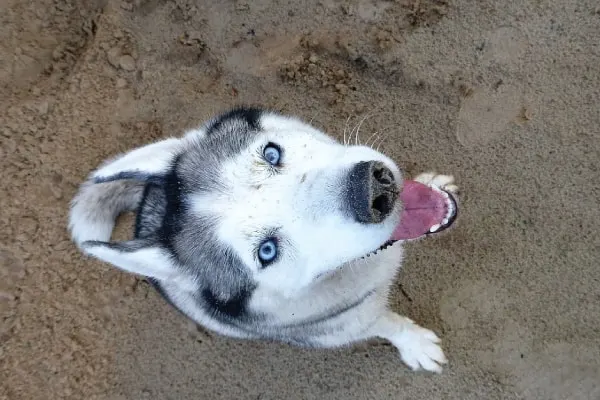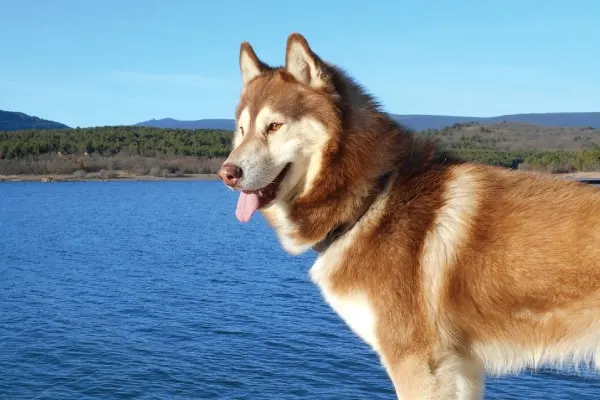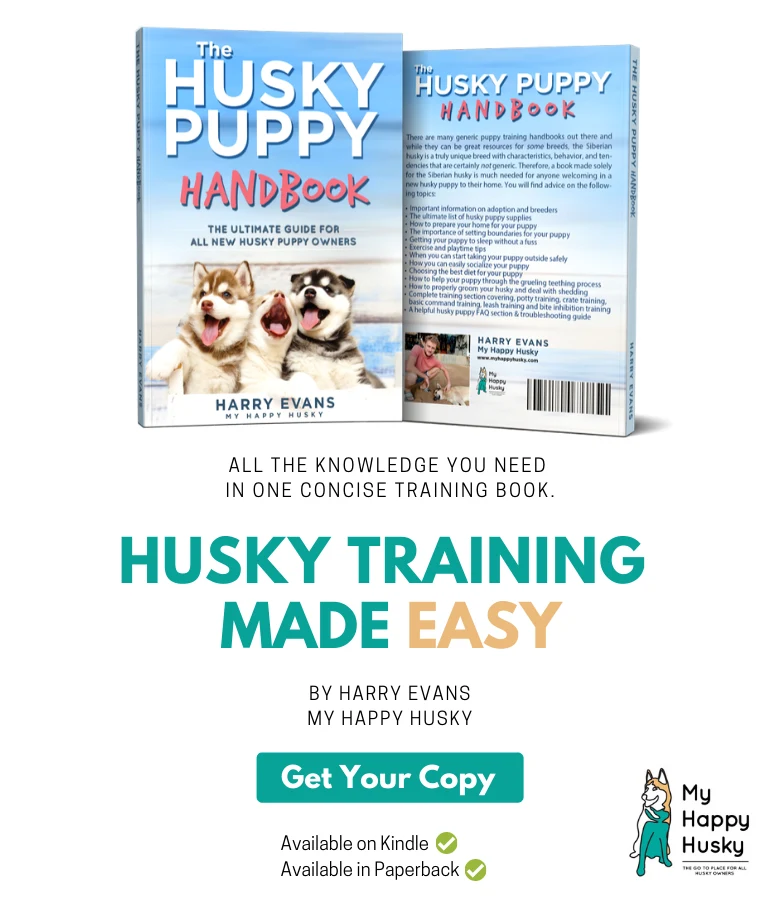If your husky has develoepd a bad odor, you’ll want to know why and what you can do. This article will explain everything you need to know about smelly huskies and how to fix it.
The most common reasons why a husky might become smelly include a dirty or mucky coat, unwashed paws or yeast infections, bad breath and dental issues, skin infections, or impacted anal sacs.
The good news! a bad-smelling husky is usually only temporary, and with the help of this article, you’ll be back to having your husky odor-free in no time at all.
Table of Contents
5 Reasons Why Your Husky Might Smell Bad
In order to properly deal with this smelly situation, owners need to know the true cause…
There’s no good grooming your Husky’s coat like crazy when in fact, the smell is coming from their paws.
Likewise, there’s no use overbathing your Husky when the smell is coming from their breath.
There are 5 main reasons for a bad-smelling Husky, Let’s take a look.
1) Dirt & Debris Stuck in Their Coat
Huskies are adventurous souls and love nothing more than to run, dig, jump, roll around, and get pretty filthy.
When left unattended, Huskies will find parts of your yard you never knew existed. There can be all sorts of dirt and muck in your yard from general dirt, other animal poop, or even the odd dead bird. Who knows!
Typically, the Husky’s double-layered coat helps to protect against dirt and muck getting stuck in their fur but sometimes it doesn’t work.
If your Husky has some laid in sticky mud or has rolled in some other animal poop, it’s likely this will remain inside your Husky’s coat long enough for it to kick up a bad smell.
So first, have a sweep of your Husky’s coat to find any dirt or unwanted muck. Please do not suddenly rush to bathe them, I will cover more about bathing later.
2) Unwashed paws or yeast infections
The paws on dogs nearly always have this certain corny type of smell. For the most part, this smell is natural, as long as it’s faint and not too strong.
Yep, it’s time… Take a quick whiff of your Husky’s paws you will soon know if the smell is ok or not ok!
Why do dogs’ paws always have that smell? All dogs actually have sweat glands in their feet. Whenever your dog is hot or recently active, they will likely need to sweat and this can be from their feet. The sweating can also be triggered by the feeling of anxiety or stress.
On top of sweating, the paws are the first contact with the ground. Who knows what kind of muck your Husky is walking and running in. This can also get stuck in their nails and between toes and if left can become very smelly.
3) Bad Breath & Dental Issues

It’s important for us owners to regularly check our fluffy friend’s mouth. There can be so many things going on with their teeth and gums and serious health issues can arise if we aren’t monitoring.
Why does my husky have bad breath?
If your Husky has bad-smelling breath it can be due to a number of things. Each of which will be fixed differently. Some of the causes of bad breath include:
- Your husky has recently eaten something foul
- Stomach or digestive issues
- The dog food your husky is eating
- Build up of dirt and tartar on the teeth
- Gum disease
If you suspect that your husky has recently eaten something foul in the garden, this is likely the cause of a sudden change in their breath.
Encourage them to drink water and monitor them to make sure they aren’t in any discomfort. If your Husky displays a lot of discomfort for a prolonged period of time, contact your vet as soon as possible.
The diet that your husky is on can also affect their breath, AND it can also be the cause of stomach and digestive issues. Both of which can cause a foul smell to come back up into your Husky’s mouth.
Sensitive stomach in Huskies is a serious and common problem. I really recommend you take a look at one of my other articles that covers this topic completely.
Depending on what type of food your Husky eats regularly, a layer of tartar can possibly build-up. Tartar and plaque build-up creates bacteria, which then starts to smell.
There are two good ways to combat this. One is to give your Husky some quality dental sticks. I’ve found these dental sticks to be very good. Secondly, brush your Husky’s teeth, this can be challenging and it’s a service your vet will offer if you don’t want to do it.
Gum disease can also be why your Husky has bad breath. Gum disease is, unfortunately, a very common health issue with all dogs. Regular checkups with your local veterinarian are important to keep an eye on this.
4) Skin Infections
With the thick fur of your Husky, it can be quite hard for us to see the skin directly. Although there are telltale signs to watch for that may indicate an issue with the skin.
If your Husky is scratching a lot and seems generally irritated, nibbling around their paws and underbelly. This could indicate that something is wrong with their skin.
There can be many reasons for skin infections, which are best saved for another article. The important point here is knowing that this could cause the bad smell.
With dry skin, which is common, the way your dog’s body will try to deal with this is to produce even more oil. However, the excess of oil can build up and end up smelling.
5) Anal Sacs (and other issues)
But this can be a thing for breeds with long hair. Some Huskies have longer hair than others but usually it nearly always has a little length around the bum area.
If your Husky has recently eaten something bad, too many treats, emptied your bin, or is just on the wrong dog food this could all lead to some runny poop. The danger of runny poop is that it can get caught to the sides of hair around the bum.
Of course, this type of smell is easily recognizable, but still, if you have a bad smell around, have a check around your Husky’s bum to make sure nothing foul is stuck there.
On top of this, it could be Anal Sacs, these are two small glands located just inside your Husky’s bum. If this becomes impacted it can cause an extremely foul-smelling secretion to come out and get caught in the surrounding hair. If you notice your dog scooting their bum on the floor, a visit with your vet is needed!
In regards to impacted anal sacs, Christie Long, DVM explains that “we typically shouldn’t smell the discharge from these glands because they should only work during defecation.” Modern Animal
Popular articles on My Happy Husky ⭐
● Why Does My Husky Pant So Much? What You Need to Know
● Why Do Huskies Howl? The Complete Husky Howling Answer
● How to Deal With Husky Shedding: The Best Tips For Shedders
● Can a Husky Be Left Alone? Important Guidelines!
5 Ways to Stop Your Husky Smelling
After you have identified where the smell is coming from and what it is, you will be better ready to take action and regain the pleasant smell in your house!
1) Regular Grooming & Inspection of Coat
If you have discovered something foul in your Husky’s coat then before you go to bathe them, you need to pick up your brush.
If the muck is wet, you should remove as much of it as you can with an old towel. Then as long as there is only a little left, proceed to dry it with a hairdryer. After it’s dry, hopefully, you will be able to break it down and remove the bits with your brush.
- The best brush for this will be a simple rake brush It’s strong enough and has space for the rake to pass through, instead of fully tugging on the hair, which could be painful.
2) Keep Your Husky’s Paws Clean After Walks
Perhaps your Husky has smelly paws, whether it’s due to standing in something foul or there’s a yeast infection, you’ll need to do something about it as soon as possible.
If it’s simple muck on your Husky’s paws then you need to bathe them in mild all-natural dog shampoo and give them a good wash.
I strongly recommend Earthbath Natural Oatmeal & Aloe Vera Dog & Cat Shampoo.
Please don’t make the mistake of using regular shampoo, or even worse dawn washing liquid. No matter what people say, these options have strong chemicals and ingredients that you do not want to be putting on your Husky.
If your Husky has a yeast infection. You should either see your local veterinarian as soon as possible or if you suspect it’s only small, you can try an apple cider vinegar solution to bathe your dog’s paws in. As long as there is no broken skin, you can use a 50:50 solution, apple cider vinegar and water. Always thoroughly dry the paws after.
3) Clean Your Husky’s Mouth Regularly
After you know exactly why your Husky has bad breath, you can act accordingly.
As well as brushing his teeth regularly, try giving your Husky some quality dental sticks to combat the tartar and plaque build-up. This can be a regular treat you can give in order to keep tartar and plaque build-up to a minimum.
Dry kibble instead of wet dog food will also help to avoid this unwanted build-up.
If your husky is showing any discomfort or not eating their food, it could mean they are having some stomach or digestive issues, which in turn could be causing the bad breath.
If you think this could be it then it’s worth opting for a new kibble. Just remember to do this gradually. Siberian Huskies usually have stomach issues and are sensitive to a lot of dog food. Make the transition slow after you have found a good alternative.
If after checking your husky’s mouth he has a lot of tartar or plaque build-up, it’s important to visit your vet for a dental check-up and to rule out any serious health issues. Check out the top Dental Sticks for Huskies
4) Monitor Your Husky’s Behavior
Try your best to always be conscious of what your Husky is acting like, how they usually act, and whenever their usual behavior changes.
Why? well, if your Husky is giving off a bad smell and doesn’t usually, it means something is wrong and nearly all of the time, your Husky will be giving you signs to let you know that something isn’t right.
If your husky has something stuck in their coat or has an issue with their skin, it’s likely they will be scratching, feeling itchy, and generally irritated by the certain location that is giving them an issue. If your Husky is scratching more than usual, it warrants a thorough inspection of his coat.
This can be the case for all of the above causes, it’s likely your Husky will show the issue with some kind of behavior.
Sometimes, a change in behavior can also signify something more serious, and the quicker you are able to detect this and make an appointment with your vet, the better!
5) Bathe Your Husky
We left this one last for a reason. It’s super common to see people bathing their Huskies every other week and this is way too much! Despite wanting to try to keep our fluffy friends healthy and clean, giving them too many bathes will actually have the reverse effect.
Our Huskies naturally do a fantastic job at cleaning themselves and bathing too much will mess up their skin, likely dry it out which will lead to further issues down the line.
This isn’t the rule for all dogs, but for Huskies, some owners only bathe them 2 or 3 times a year! This is perfectly fine and is considerably better than bathing 2 or 3 times a month!
Bathing your Husky is good, and it is important but you should limit it to no more than 1 time every 3 months. This way you will ensure you do not dry or irritate their skin.
When you do come round to bathe time, it’s a wise move to use a mild, natural ingredient shampoo like this one (link opens amazon) Huskies have sensitive skin so human shampoo, regular pet shampoo, or dawn washing up liquid, is a big no-no.
When Do You Need To See a Vet?

There are some things we can deal with ourselves, but others we can’t. It depends on your situation and what has happened with your Husky. If the cause of the smell is something simple and explainable like your Husky has rolled in something, or they stood in poop, we can fix this ourselves.
However, when it becomes a little more complicated, like bad breath, or you can see visible skin irritation or even a yeast infection, you’ll likely need help from your vet.
Whenever you feel unsure of what it is, or you observe some change in behavior from your Husky that could be suggesting discomfort. You should contact your vet as soon as possible.
First, observe, check & inspect, take action by yourself or call a veterinarian if you’re unsure.
Keep a Clean Environment
Try your best to keep your house and yard clean. General maintenance and cleaning will help limit the amount of dirt and bacteria your Husky is exposed to.
Be sure to wash and change their bed regularly, clean their paws after dirty walks, try to monitor your yard and remove, and nasty mess from other animals, and in general keep things clean.
This all contributes to a healthier and safer living area for you and your Husky 🙂
Summary
If you have a smelly Husky right now, I’m absolutely confident you will be able to figure it out and help the situation, if not, always remember that a vet can help.
Thank you for reading and if you have had any experiences of your Husky smelling bad, comment below! Let us know what it was and how you fixed it. You may just help another Husky owner!
Other Popular Articles
Best Food For Huskies
Why Your Husky Has Dry Skin?
Best Dental Sticks For Huskies
Why Do Huskies Have Blue Eyes?
Most Recommended For Huskies 🐶
Best Brushes For Husky Shedding ⭐
My two favorite brushes for a beautiful coat are a simple Undercoat Rake and a Slicker Brush. These brushes when used together will de-shed and maintain your husky’s coat better than anything else.
Best Online Training Program For Huskies⭐
Brain Training For Dogs has become increasingly popular with Siberian Huskies in the last few years. It’s now recognized as perhaps the best way to train a husky in the most stress-free, positive way.
Best Husky Puppy Book ⭐
If you would like to support My Happy Husky directly and have an easy to read and entertaining guide for training your husky puppy, check out my book The Husky Puppy Handbook on Amazon. All purchases are greatly appreciated.

Disclaimer
The advice given in this article is for educational purposes only and does not constitute professional advice in any context. Before making any decisions that may affect the health and/or safety of your dog, you should always consult a trained veterinarian in your local area. For the FULL disclaimer Visit HereCopyright Notice: The content produced and published on My Happy Husky is unique and original. My Happy Husky makes an active effort to search for plagiarized content using plagiarism detection software. If plagiarized content is found, action will be taken.
